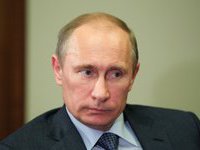Putin goes to Kyrgyzstan to solve the fate of Afghan drug trafficking
Russian President Vladimir Putin arrived in Bishkek, Kyrgyzstan, to take part in the informal summit of the Collective Security Treaty Organization (CSTO: Armenia, Belarus, Kazakhstan, Kyrgyzstan, Russia and Tajikistan). Among the main issues on the agenda of the forum is the situation in Afghanistan in connection with the upcoming withdrawal of international troops in 2014 and the fate of Bishkek airport Manas, from which NATO is to withdraw its air base the same year as well. Putin will also hold bilateral meetings with counterparts from Kyrgyzstan and Tajikistan, Almazbek Atambayev and Emomali Rahmon. With the leader of Tajikistan, Putin is expected to discuss issues on the provision of military assistance to the republic and the terms for ratification of the agreement about the 201st Russian military base.

Afghanistan became a key topic for discussion at informal meetings of foreign, defense ministers and secretaries of CSTO Security Councils. Experts analyzed different scenarios for the development of the situation in that country. However, the Secretary General of the Collective Security Treaty Organization, Nikolai Bordyuzha, said last week that the most realistic outlook was negative. "The growing influence of extremists is very likely to happen, which is fraught with a variety of negative consequences, including the Civil War and the division of the country on the base of ethnic principles," Russian president's special envoy for Afghanistan, the head of the Asian Department of the Ministry of Foreign Affairs, Zamir Kabulov said.
Noteworthy, NATO is opening a regional office on June 3 in Uzbekistan, which suspended its membership in the Collective Security Treaty Organization. In the first phase, the office will undertake the coordination of all sides in the scheduled phased withdrawal of troops from Afghanistan. The country's authorities are concerned that with the start of withdrawal of NATO troops from Afghanistan extremist organizations will become more active, Uzbekistan may take the first blow.
In addition, after the departure of NATO troops, drug trafficking from Afghanistan is likely to grow. Reportedly, Vladimir Putin will offer a series of breakthrough steps at the summit to significantly reduce the transit of heroin and other drugs from Afghanistan to Russia and other countries of the CSTO.
In particular, the Russian leader is expected to set forth an idea of elimination of drug trafficking not only in the CIS countries, but inside Afghanistan. According to the Russian Federal Service for the Control of Narcotics, after the withdrawal of international forces from the country, the CSTO Collective Defense Forces in conjunction with interested states will be asked to proceed to the physical destruction of warehouses, laboratories, factories and poppy plantations in Afghanistan.
In this case, the Federal Drug Control Service offers not only military, but also humanitarian methods of struggle. For example, there is an idea to create a state corporation for the development of Central Asia. According to the chairman of the State Anti-Drug Committee, Director of the Federal Drug Control Service, Viktor Ivanov, the corporation will distract former Soviet neighbors of Afghanistan from their participation in illegal drug trade. For Afghanistan, there can be economic projects proposed, in which not only the CSTO, but other reputable international organizations such as the UN, SCO and others will be involved.
As for the future of Manas airbase, the Kyrgyz side believes that the CSTO partners can arrange a major international logistics center at the airport. The activities of the center may help compensate the economic damage that Manas will incur after the departure of the U.S. military.
In addition, Kyrgyzstan intends to offer other participating countries to implement a project for the construction of the railway between Tajikistan, Kyrgyzstan, Kazakhstan and Russia. The new railway would create a new transport artery in the system of collective security, but also give an opportunity to enter the markets of the Asian region.
Subscribe to Pravda.Ru Telegram channel, Facebook, RSS!




